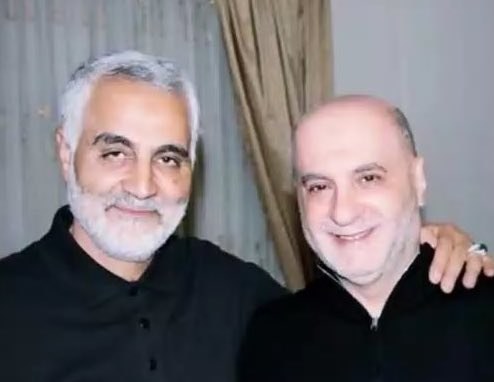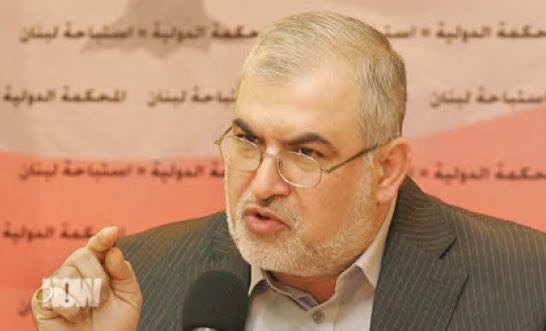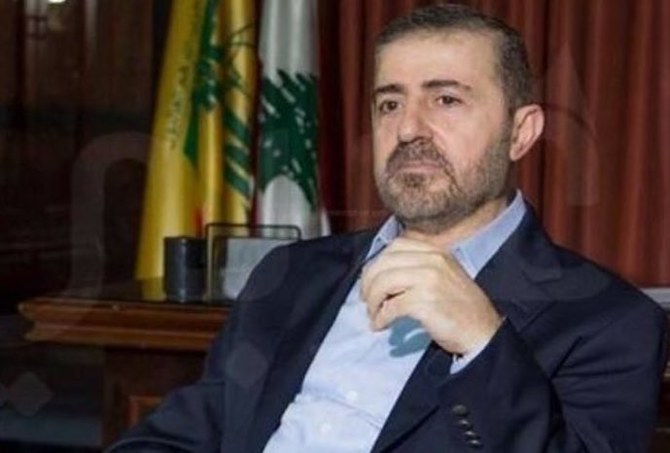WASHINGTON/BEIRUT: The US imposed sanctions on Tuesday on two Hezbollah members of the Lebanese Parliament and a security official with the Iran-backed group.
The Office of Foreign Assets Control (OFAC) of the US Department of Treasury said MPs Amin Sherri and Muhammad Hasan Ra’ad, members of the Loyalty to Resistance Bloc, acted on behalf of Hezbollah, which used its parliamentary power to advance its violent activities.
OFAC released a photo of Iranian Quds Force commander Qasem Soleimani with his arm around Sherri’s shoulder.
The other man blacklisted is Wafiq Safa, a top Hezbollah official close to leader Hassan Nasrallah. The US said Safa maintained the group’s ties to financiers and arranged the smuggling of weapons and drugs.
Ra’ad, 64, is the head of Hezbollah’s parliamentary bloc and an MP since 1992. Sherri, 62, is a 17-year Hezbollah veteran of Parliament representing Beirut.
“Hezbollah uses its operatives in Lebanon’s Parliament to manipulate institutions in support of the terrorist group’s financial and security interests, and to bolster Iran’s malign activities,” said Sigal Mandelker, Under Secretary of Treasury for Terrorism and Financial Intelligence.
The newest sanctions brought to 50 the number of Hezbollah individuals and entities blacklisted by the Treasury since 2017.
The move came as the US steps up pressure on Iran and its alleged “proxies” in the Middle East, including Hezbollah, which Washington accuses of encouraging “terror” attacks.
Today, the U.S. designated three senior Hizballah officials for efforts to undermine Lebanese sovereignty. Any distinction between Hizballah’s political and military wings is artificial and we call on our allies to designate Hizballah in its entirety as a terrorist organization. pic.twitter.com/alrq1vSUtG
— Department of State (@StateDept) July 9, 2019
What the sanction mean
It was the first time the US Treasury had placed Hezbollah lawmakers on its blacklist, which forbid US individuals and businesses with a US branch — including leading international banks — from doing business with those sanctioned.
The sanctions bar US citizens from dealing with the three men, block any assets they have in the US and limit their access to the US financial system.
A Trump administration official said the US wanted the sanctions to have a “chilling effect” on anyone who does business with Hezbollah.
“It is time we believe for other nations around the world to recognize that there is no distinction between Hezbollah’s political and military wing,” a senior administration official who insisted on anonymity told journalists.
“To any member of Hezbollah considering running for office, know that you will not be able to hide beneath the cover of political office,” the official said.
“The message is actually that the rest of the Lebanese government needs to sever its dealings with these figures,” the State Department said.
The Treasury Department also called on “the international community to include Hezbollah on terrorism lists,” stressing that there is “no distinction between Hezbollah’s political and military wing.”
“The Lebanese government must sever its contacts with the sanctioned Hezbollah members. We will not close our eyes to members of the party in the government,” it added.
Hezbollah defiant
Hezbollah deputy Ali Fayyad said: “The US sanctions resolution is an insult to the Lebanese people, first and foremost” He added “There must be an official position from the parliament and the government on what affects Lebanon’s sovereignty.”
Hezbollah is represented in parliament by 13 deputies. The bloc is led by Raad, who was born in 1955 in the town of Jbaa in southern Lebanon, and is married with five children. He studied philosophy at the Lebanese University and participated in the creation of the Lebanese Union for Muslim Students, which was active in the late 1980s.
According to the Loyalty to Resistance Bloc’s website, he was one of the “early activists in Hezbollah and the Islamic resistance movement, and one of the founders of the support committees for the Iranian Islamic revolution in 1979. He headed the editorial board of the political weekly newspaper Al-Ahed for 10 years and took leadership positions in Islamic work.”
Raad was elected to represent southern Lebanon in 1992 and re-elected in 1996, 2000, 2005 and 2009. He was a member of the Hezbollah delegation, led by Secretary General Hassan Nasrallah, that attended the National Dialogue Conference in 2006, which was organized to find a solution to the political crisis in Lebanon after the adoption of UN Security Council Resolution 1559 on September 2004, which called for free and fair presidential elections and the withdrawal of foreign forces, and the assassination of former Prime Minister Rafik Hariri in February 2005.
Raad, an outspoken defender of Hezbollah’s positions, denounced “the United States and those who are planning to defeat the spirit of resistance so that no obstacle remains to the ‘Deal of the Century’ (economic Middle East peace plan) they are marketing, by trying to subjugate us by means of the economic siege, starving us and imposing conditions on our sovereignty.”
He added: “We are interested in addressing this plan because it is aimed at our existence. They want to twist our arms.”
Sherri was born in 1957 in Beirut to a family that worked in the fields of trade and industry. He was elected to the parliament in 1998, reelected in 2004 and held his seat until 2010, and was elected again in 2019.
Safa, who is in charge of Hezbollah’s Liaison and Coordination Unit, oversees Hezbollah’s interactions with the international community and the Lebanese security agencies.
Trusted by Nasrallah
The website Janoubia.com, which opposes Hezbollah, said that Safa “represents by himself an international and Arab network as well as a Lebanese network. He is always present and interferes in the smallest details.
Even when there is a disruption in the contacts between Hezbollah and the Lebanese political leaders, Safa remains in touch with army officers, the Future Movement, the Progressive Socialist Party or the Lebanese Forces, the site said.
Safa was Hezbollah's first negotiator in all the prisoner-exchange operations with Israel since the founding of the party and was directly linked to Hezbollah Secretary-General Hassan Nasrallah. Safa enjoys the Trust of Nasrallah as one of the party's primary and senior cadres.”
Known as a man of few words who is very secretive, Safa was a member of the Shiite Amal Movement militia before joining Hezbollah in the 1980s after the 1978 disappearance of Shiite religious leader Musa Al-Sadr in Libya.
“Targeting Hezbollah deputies in the sanctions might be for intelligence reasons, because of some telephone calls or frequent visits to a place,” said former Lebanese ambassador to Washington Riad Tabbara.
He added that the US call for the Lebanese government to sever relations with the two deputies and the security official “is subject to negotiations.”
He explained: “Hezbollah has already been on the list of sanctions, and its representatives in the government and parliament receive salaries from the Lebanese government. This comes in accordance with arrangements agreed between the Lebanese and US sides through delegations from the Lebanese Central Bank and from the parliament that visited Washington and reached solutions that do not harm Lebanon or break US sanctions.
“The United States is concerned about Lebanon’s economic, security and political stability, and it goes easy with Lebanon under this ceiling.”
The latest sanctions are “a message to Iran and its arms in the region,” he added.
(With AP)






























